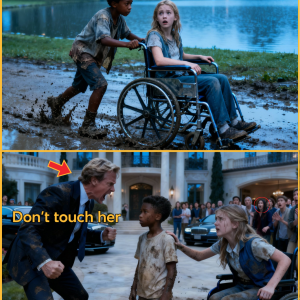
When I rushed my newborn to the ER in the middle of the night, I was terrified and exhausted. I didn’t expect the man across from me to make it worse—or for a doctor to change everything.
My name is Clara, and I’ve never known this kind of tired.
Back in college, I survived on iced coffee and bad choices. Now it’s lukewarm formula and vending machine snacks at 3 a.m. Life has me running on instinct, panic, and love for a little girl I barely know, but love more than anything.
Her name is Emily. She’s three weeks old. Tonight, she wouldn’t stop crying.
We sat in the waiting room, just us two. I was in stained pajama pants, cradling her burning-hot body against me. Her fists clenched, legs kicking, voice hoarse. Something was wrong.
“Shh, Mommy’s here,” I whispered, though it did nothing.
The C-section stitches throbbed, but I ignored them.
At 29, with no family left and no father—Ethan bolted the moment I told him—I was alone, jobless, and praying my baby would be okay.
Then a sharp voice broke the room.

“Unbelievable. How long are we expected to sit here?”
Across from me sat a man in his 40s, slicked-back hair, Rolex flashing, suit pristine. He snapped his fingers at the nurse.
“Can we hurry this up? Some of us actually have lives.”
The nurse, badge reading Lydia, stayed calm. “Sir, we treat the most urgent cases first.”
He laughed. “Her? She looks homeless. And that brat—are you seriously putting her before people who actually pay into the system?”
Heat rushed my face, but I held Emily tighter. He wasn’t done.
“This is why the country’s a mess,” he muttered. “People like her wasting resources while the rest of us foot the bill.”
Finally, I met his eyes. My voice came out low, steady. “I’m here because my daughter is sick. She hasn’t stopped crying for hours. But go ahead—tell me more about your hard life in that thousand-dollar suit.”
He rolled his eyes. “Spare me.”
Before anyone else could speak, the ER doors burst open. A doctor strode in, scanning the room.
The man with the Rolex stood, smoothing his jacket. “Finally. Someone competent.”
But the doctor walked straight past him and stopped at me. “Baby with fever?”
“Yes,” I whispered, clutching Emily.
“Follow me.”
The man exploded. “Excuse me! I’ve been waiting an hour with chest pain—might be a heart attack!”
The doctor turned. “You’re not pale, not sweating, no shortness of breath. You walked in fine. I’ll bet ten bucks you strained a muscle golfing.”
A laugh slipped from somewhere in the room. Even Lydia hid a smile.

The doctor’s voice sharpened. “This infant has a fever of 101.7. At three weeks, that’s a medical emergency. Sepsis can kill within hours. So yes, she goes first. And if you ever insult my staff again, you’ll be escorted out. Your money doesn’t impress me. Neither does your watch.”
Applause rippled through the waiting room as I followed him inside, knees weak but holding strong to Emily.
In the exam room, Dr. Harris examined her gently. “Good news,” he said at last. “It’s a mild viral infection. No sepsis. No meningitis. You caught it early—she’ll be okay.”
Tears spilled as I whispered, “Thank you.”
Later, Lydia brought two bags—donations from nurses and other moms. Formula, diapers, even a tiny pink blanket with a note: You’ve got this, Mama.
My throat tightened. “I didn’t think anyone cared.”
“You’re not alone,” Lydia said softly.
When Emily’s fever broke and we were discharged, I carried her back through the waiting room. The man with the Rolex sat red-faced, his sleeve tugged down over his watch. No one looked at him.
But I did.
And I smiled.
Not smug. Just quiet, certain. A smile that said, You didn’t win.
Then I walked out into the night, my daughter safe in my arms—stronger than I’d been in weeks.



